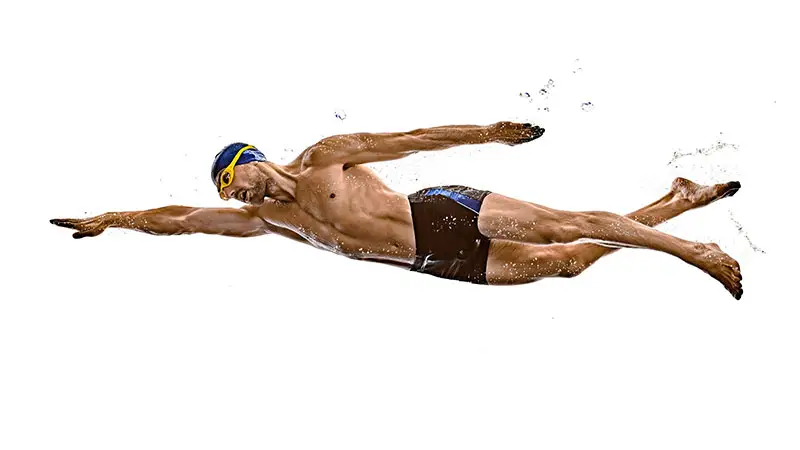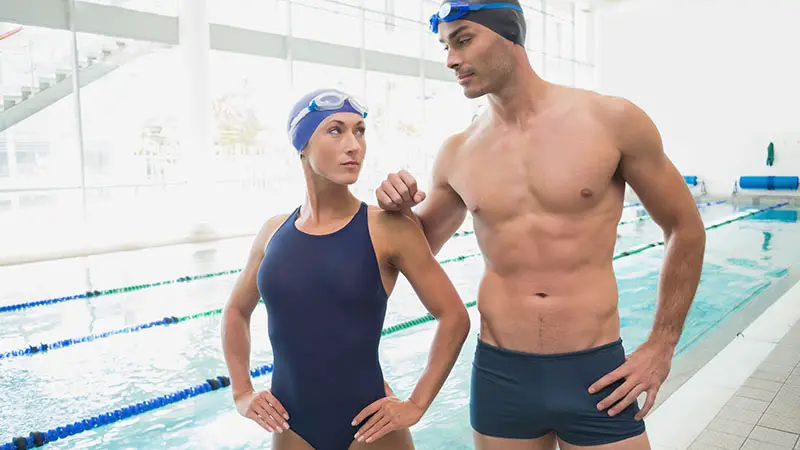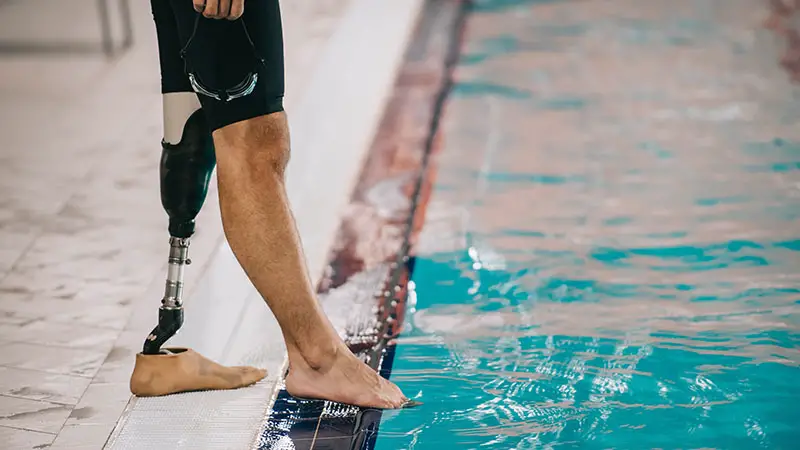Swimming In The Winter
When people think about swimming, they often think about cooling off in the sweltering summer heat. They might even associate swimming with the beach, pool parties, or summer workouts. What most people don’t think about when they imagine swimming is winter.
Just because swimming isn’t the first thing that comes to people’s minds when they think about winter doesn’t mean it shouldn’t be an option for a great workout! Swimming in the winter time actually has some amazing health benefits.
Contents
No matter your location, whether temperatures get into the negatives or stay consistent all year long, you can probably find an indoor pool in your area. From YMCA’s to local colleges and universities to other indoor swimming facilities, a quick Google search can send you in the right direction.
There are many reasons you should incorporate swimming into your winter workout regime. Here are 11 health benefits you could gain from swimming in the winter…
Full-Body Workout

As opposed to any other form of cardiovascular workout, swimming is one of the most true forms of a full-body workout. You submerge your body in water and in order to make it across the pool, you’ve got to use your arms and legs to propel you forward (or backward) and your torso and core to keep you afloat and level. Your whole body must work in order to keep you from sinking.
Especially if you live somewhere that gets unbearably cold, your workouts can become pretty limited. Bike riding becomes more difficult and less safe. Running might require more gear that you don’t have or it may just be too cold to run altogether. But, if you have access to an indoor pool, you can get an amazing full-body workout any time of the year.
Better Circulation
Did you know that the winter months can affect our circulation? It’s because the crisp weather constricts our blood vessels and limits their ability to circulate our blood efficiently. But swimming in the winter can actually help with this common issue.
Swimming creates hydrostatic pressure. Simply put, water puts pressure on your whole body while you are swimming. This pressure helps to push the blood through your body and to your heart, which will also improve your circulation besides helping your cardiovascular health.
Cardiovascular Health

Any form of cardio is going to be great for your cardiovascular health because it gets your heart rate up and your blood circulating, so it makes sense that swimming helps your cardiovascular health. They have found that even swimming as little as 30 minutes per week can prevent major cardiovascular complications such as heart disease and stroke.
Burns Calories
Typically, people gain one to two pounds over the winter months. Whether it’s from lack of activity or an increase in holiday foods, many people face an influx of their average weight.
Because swimming is a form of a cardio exercise, it not only improves your cardiovascular health, it will also help you burn some serious calories! You can burn up to 500 calories per hour while swimming. So, if you’re looking to get into a healthy calorie deficit, this is an excellent option! This calorie deficit can help you maintain your weight and prevent the average weight gain or even lose some extra weight, whatever your health and wellness goals may be.
Increased Muscle Tone & Strength

As I shared above, swimming is a full-body workout and a significant form of cardio. But what I have yet to share is that it can also increase your muscle tone and strength! It’s been reported that swimming can cause you to work up to 50 muscles at once! So, simply getting out there and swimming will help you tone up, but if you select a particular swimming stroke, you can target certain areas more.
For example, the Freestyle can help you tone your glutes while the breaststroke focuses more on your inner thighs and hamstrings. Whether you want to target a specific area or you want overall increased muscle toning and strength, swimming is a great option. And swimming in the winter will just be the icing on the cake, as you are keeping your muscle mass and improving your strength throughout the cold months.
Increases Mental Health
At one point or another, everyone struggles with their mental health. Whether it is stress from work, a traumatic life event, or a mental health disorder, we’ve all more than likely had times in our lives where we have struggled. On top of this, winter time can be an added risk to mental health. Known as the “winter blues”, Seasonal Affective Depression (SAD) affects approximately five percent of the United States’ population.
Though swimming won’t be a quick fix by any means, it’s been found that it can increase your mental health by reducing stress and releasing important chemicals like dopamine and endorphins. So, taking up swimming in the winter where most people are at greatest risk of suffering from mental health issues might help with your mood and mental state!
Increases Endorphins
Endorphins are feel-good hormones that are released in your brain. As mentioned above, they can help reduce your stress by bringing sensations of happiness and well-being. Swimming is a popular way to get endorphins – and exercise!
Improves Sleep
It feels like swimming, no matter the season, improves almost all aspects of life. It seems appropriate that besides all the benefits listed above, swimming can also improve your sleep.
The first way that swimming improves your sleep is because, simply put, it’s a rather exhausting exercise. Because you’re using your whole body and burning a lot of calories, your body is going to be tired. And if your body is tired, it’s going to crave rest. Hence, you’ll be more ready to sleep.
Stress is another reason that people have trouble sleeping, so when swimming reduces your stress, you’re more relaxed and ready to fall asleep.
Great For People With Injuries or Disabilities

During the winter, it’s hard enough to find workouts for abled and healthy bodies, much less for people who have disabilities or injuries. For example, if you are suffering from an ankle injury and want to run outdoors in the cold, you are more at risk of getting injured from ice or snow on the ground.
If you have access to an indoor pool, swimming should be the go-to workout for anyone struggling with injuries or disabilities because of its low impact nature. Even though swimming is a full-body workout, the weightlessness of the water allows for less stress and impact on your joints that you’d normally experience with other workouts.
Good For Social Interaction
From even the youngest of ages, swimming and water has been associated with fun and socializing. As you age, maybe you don’t play “Marco Polo” in the pool, but swimming can still be a great way to socialize with friends!
There’s just something about working out with a friend that brings you closer together. I’m not really sure if it’s the endorphins and the dopamine workout or simply the fact that you are sharing an experience with one another, finding a friend and swimming with them in the winter will be great for social interaction!
Great Way To Cross Train

As mentioned at the beginning of this article, most people don’t associate swimming and winter together. Often, people who avidly workout don’t even consider swimming as an option during the coldest months of the year, but that is part of what makes it so great.
Because your body isn’t expecting swimming in the winter, you should consider adding it to your routine! Changing up your routine and keeping your body not knowing what to expect will increase your fitness and overall performance. So, if you want to keep up your strength and conditioning in the winter, you should definitely try it.
